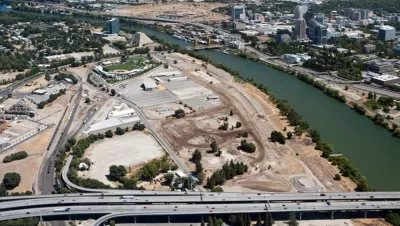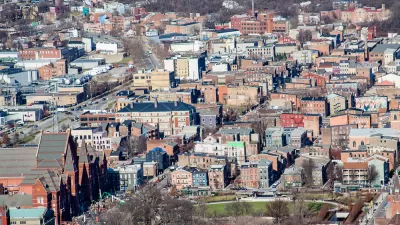CityLab University explains a controversial and misunderstood funding mechanism.

Benjamin Schneider writes a CityLab University explainer for Tax Increment Financing(TIF), a controversial revenue generation mechanism implemented in some parts of the country in various forms.
This mechanism for financing redevelopment is a powerful and controversial force in American urbanism. Every state except Arizona currently allows it, as does the District of Columbia, and it has become the most popular incentive tool for economic development in the United States as the federal government has decreased its urban development spending. TIF plays a role in megaprojects such as Chicago’s Lincoln Yards and Amazon’s HQ2 in Arlington, Virginia, as well as in smaller-scale neighborhood improvements, affordable housing, and transit projects.
Schneider also notes the controversy and debate surrounding TIF:
Depending on the specific project, and whom you ask about it, TIF is an essential mechanism for cities to stimulate much-needed economic development and revitalize neighborhoods at no cost to taxpayers, or it’s an opaque developer giveaway that puts a strain on city services without providing much public benefit.
The article includes a lot more detail by way of illuminating the concept. For additional reading after completing the CityLab article, see also a reference to a recent case study in Vermont and a report written about Tax Increment Financing by the Lincoln Institute of Land Policy in September 2018.
FULL STORY: CityLab University: Tax Increment Financing

Alabama: Trump Terminates Settlements for Black Communities Harmed By Raw Sewage
Trump deemed the landmark civil rights agreement “illegal DEI and environmental justice policy.”

Study: Maui’s Plan to Convert Vacation Rentals to Long-Term Housing Could Cause Nearly $1 Billion Economic Loss
The plan would reduce visitor accommodation by 25% resulting in 1,900 jobs lost.

Why Should We Subsidize Public Transportation?
Many public transit agencies face financial stress due to rising costs, declining fare revenue, and declining subsidies. Transit advocates must provide a strong business case for increasing public transit funding.

Paris Bike Boom Leads to Steep Drop in Air Pollution
The French city’s air quality has improved dramatically in the past 20 years, coinciding with a growth in cycling.

Why Housing Costs More to Build in California Than in Texas
Hard costs like labor and materials combined with ‘soft’ costs such as permitting make building in the San Francisco Bay Area almost three times as costly as in Texas cities.

San Diego County Sees a Rise in Urban Coyotes
San Diego County experiences a rise in urban coyotes, as sightings become prevalent throughout its urban neighbourhoods and surrounding areas.
Urban Design for Planners 1: Software Tools
This six-course series explores essential urban design concepts using open source software and equips planners with the tools they need to participate fully in the urban design process.
Planning for Universal Design
Learn the tools for implementing Universal Design in planning regulations.
Smith Gee Studio
Alamo Area Metropolitan Planning Organization
City of Santa Clarita
Institute for Housing and Urban Development Studies (IHS)
City of Grandview
Harvard GSD Executive Education
Toledo-Lucas County Plan Commissions
Salt Lake City
NYU Wagner Graduate School of Public Service





























